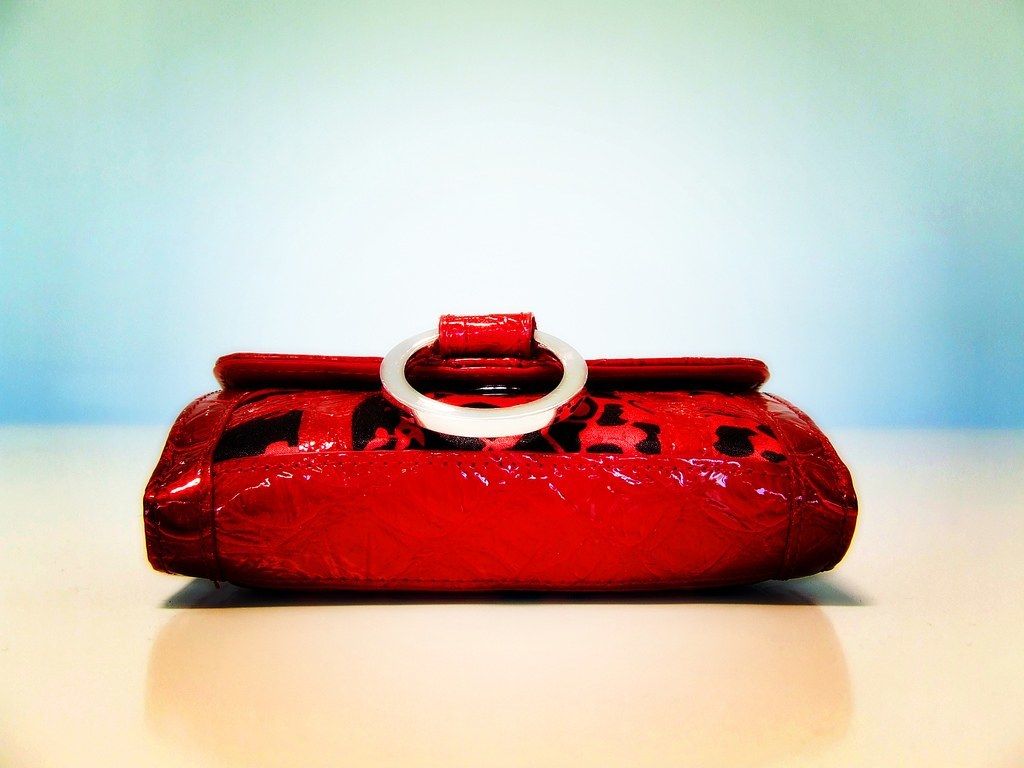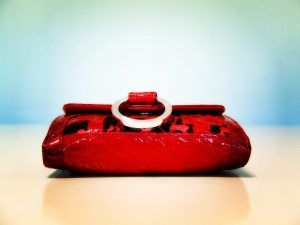
Spirituality and Money: The Pastor and the Purse
This article is written by Consumerism Commentary’s new columnist, Ellen Cooper-Davis. Ellen’s column will look at the role of spirituality within the context of personal finance. This first article serves as an introduction to this new column, and your feedback is welcome.
Give me your credit card statement, and I’ll tell you your theology.
Well, I may not be able to say for certain whether you believe that Jesus was the literal son of God, or just a good teacher, or whether you believe in God at all, for that matter. But the choices we make about where to spend–and not to spend–our money offer insight into what we really believe is important, what we value deeply, and what we think the world needs. Some people do this by shelling out extra cash for organic vegetables. Some do this by patronizing local businesses over chains. Some do this through direct political or charitable donations.
 Sometimes, there is a gaping chasm between what we say is important to us, and what we actually spend money on. For example:
Sometimes, there is a gaping chasm between what we say is important to us, and what we actually spend money on. For example:
- We might say the environment matters, but buy bottled water.
- We might proclaim ourselves pacifists, but let our retirement funds be invested in weapons manufacturers.
- We might claim concern for and solidarity with the world’s poor, but purchase clothing manufactured by sweatshop labor.
In other words, our spending can say something about how we are or are not living out our spiritual values.
Whether or not you have a religion that you practice, every human being on this planet has spirituality. Our spirituality is our relationship with the big picture. What is most important? What matters? How should I live? What are my responsibilities? Human spirituality is the capacity we have to explore our connection to that which is, in the words of 20th century theologian Paul Tillich, of Ultimate Concern. For a Jewish person, that might be God. For a secular humanist, that might be the whole of humanity. Either way, our spirituality points us beyond our own selves to wonder about our connectedness to something bigger.
Money and spirituality are not always easy companions. In many religious communities, money is practically a taboo subject, until the annual fund drive comes around. Similarly, I’m pretty sure that gathering a bunch of Wall Street hedge fund investors for a candid conversation on how their spirituality plays out in their work probably wouldn’t go over well. But the reality is that both are important tools in how we build our lives as human beings, and both can be important indicators of what we think that life ought to be about.
So nevermind the taboos, the sideways glances, the polite chit-chat. Once a month, we’ll meet here at the intersection of spirituality and money, and try to get the two talking about life, the universe, and everything. Let us know if there are particular questions or conversations you’d like to see explored here. And in the meantime, the next time you swipe that card, ask yourself how many points you still need to rack up in order to get to heaven.
What is most important to you? Does your relationship with money reflect those spiritual values?
Editor’s note: See the “About the Author” section below to learn more about the author, Ellen Cooper-Davis. Ellen’s column will appear monthly on Consumerism Commentary.
Photo: meemal

Article comments
There is a similar religion and money thread on some of the other blogs i follow. I am glad to see this here and get another take on some of the issues of religion and finance.
Hmm. . . I take the opposite tack, I freely admit to not aiding the poor or caring about the environment. I’m pretty much just out for me and my friends and family and enjoying life during my time on Earth. I do consider myself spiritual, but in a way distinct from both religion and conventional atheism.
Hmmm…I like this angle you’re taking, and I look forward to following future posts. My relationship with money certainly reflects the religious values my parents taught me from a young age, but I can’t say my spending is always in line. Alas, I still buy bottled water and drive a major gas guzzler.
It would be impossible to always align our values with our spending 100%. Even if we were incredibly mindful, there are social and economic structures that perpetuate all kinds of inequality and injustice, and we participate in those systems without always realizing it. More about that in a future post!
Yes, I think that my relationship with money reflects my spiritual values. I am a Christian and believe in tithing my 10% and giving when and where needed and led. You could look at our bank statements and you could see that we do give our 10% although not all of it is to our church. The Bible said to bring it to the store house so we also support our local Christian radio station by our tithe and a missionary family. We give to people who are down own their luck and have been known to give to the homeless. But one thing I want to make clear is that this will not get me to heaven this is just an example of obeying the requests of God. I also want to make it clear that I am not the kind that send my money to radio or TV evangalist for a “prayer cloth” guaranteed to make me healthy, wealthy and wise. Nothing burns me up more that the TV evangalist that try to sell that crap. I also do not believe in the “name it and claim it” bunch. I know lots of good people who tithe and do all they can and they barely make ends meet.
I just recieved one of those ‘prayer cloth’ ads in the mail. It looked phoney and tacky. I filed it without reading. These things offend my spirit.
When I was a member of a church, I tithed regularly, until I became convinced my pastor and his team weren’t being good stewards of money that was being given sacrificially. As I look for another church home, I’ve decided to support food pantries, the local Humane society and Doctors without Borders, in addition to giving start-up resources to a friend who’s building a food pantry for her church.
I’ve also sponsored 4 children through Compassion International over a 20-year span, and I was thrilled to learn that my first ‘child’ immigrated to the US with his family a few years ago and is now a police officer in NYC.
With regard to this particular article, her statement about “you say you’re concerned about the environment, but still buy bottled water,” was very convicting to me. I write a blog about my quest to become more environmentally friendly, yet bottled water is one thing I can’t seem to give up. I need to rethink my position on that one a little harder. Thanks for the gut check.
In addition, making bottled water often uses a great deal of oil, and the less oil we buy from other countries, the better off we’ll be.
I drink distilled water that I buy in gallon jugs.Then I use a stainless steel bottle to carry it with me. This may help you reduce the use of plastics. I also recycle the jugs after I refill them to use in the event the pump goes out. (no electricity)
I don’t consider myself to be a very religious person so most of the article doesn’t mean much to me but I do what I can to help Goodwill, the American Red Cross and other noble charities.
You can be spiritual and have values without being particularly religious… it’s not a prerequisite.
Amen, Flexo!
I offer cash for the food pantry or a local family who has to experience the horrors of childhood cancer. I’m not concerned how the family uses the money because even a movie outage will divert attention from the illness. We don’t have homeless people here, we take care of our own and no one minds providing a roof over the heads of others. There was one lady and her kids a few years back and someone noticed they were living in a car. They contacted Catholic Charities and the family was taken care of. Our local taxes have a listing under property tax that shows what we pay each year for social services. I’m fine with this.
I like giving back to my local community by shopping at mom and pop food markets. I also help family out as much as possible. For people who buy products made in sweat shops, I wonder if they buy knowing this or unknowingly….
One of the reasons I give money to homeless people is that a pastor told me that you should look for the God in everyone. Although I find those WWJD bracelets a bit cloying, I do try to remember that God wants us to be kind and compassionate.
I am currently out of town attending a conference. My daughter and I were having a bit of lunch and I noticed a down-on-his-luck man sitting on a concrete planter outside Panera Bread, looking in. I went out but before I could reach him, an elderly gentleman who’d left ahead of me set down a Panera bag and a container of coffee. The man smiled and started to open the bag. I said, “I wonder if I could help you out a little?” and gave him a dollar. He thanked me and said, “God bless you.” I replied, “You’re welcome, and He already has.”
A few years ago, I read an article on the new 7 deadly sins that were released by the Catholic church. One of them was being excessively rich(or obscenely so). Now, I’m not sure if this is being obscenely wealthy and only spending it on yourself or if this is including some of the world’s richest people who do good with their money like Bill and Melinda Gates or Warren Buffet. As for my own theology, I do what good I can. I try to only shop stores close to my region, carpool when I can, and in my area recycling is not available. But you have to do what good you can.
tigernicole86,
I find this humorous as their is a branch of Charismatic Christians who believe that if you are not well off you do not have enough faith. You should have money for homes, cars, and other luxuries.
I find this humerous because the Catholic church is the richest land owner in the world. I’m a devout Catholic, but feel churches want to own our pocket books.